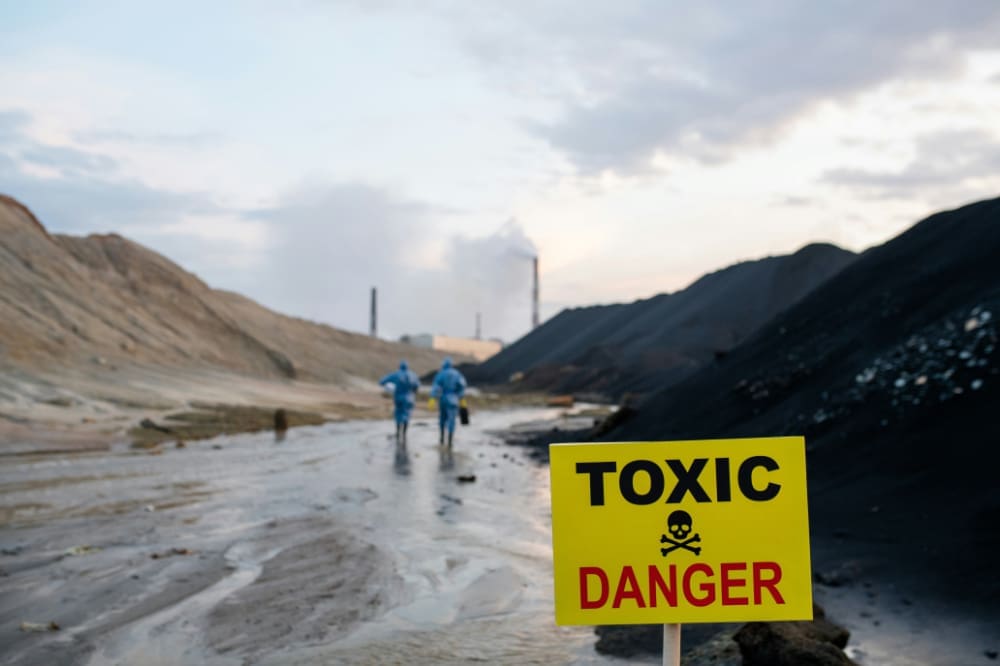Imagine going to eat at a Michelin-starred restaurant. You order your favorite dishes, and choose a nice bottle of fine wine to go with them. You’re super excited, and can’t wait to experience the combination of skillful cooking and quality ingredients.
Then your food arrives, and although it is presented on fancy plates, you can quickly tell that the food is microwaved from frozen, and the wine is from the supermarket bottom shelf. Sounds pretty disappointing doesn’t it?
Well, that’s the kind of disappointment that greenwashing can cause; for consumers, and for the planet.
If you’ve never heard the term before, in a nutshell, greenwashing is when a company falsely presents itself as environmentally friendly, often to mislead consumers. An example could be — a company labeling a plastic product as ‘biodegradable’, but in reality, the product only breaks down under specific industrial conditions, unavailable in most places.
In this case, the eco-conscious consumer is led to believe that once they’re finished with the product, they can throw it in the compost and it will return safely back to the earth, pollution-free. If they were to eventually find out the truth; that they have unwillingly contributed to plastic pollution, no doubt they would feel disappointed. And probably a little angry.
And we don’t want to bring any disappointment or anger into the world do we!? We want to bring love, excitement, and satisfaction. And honesty!
So to help you do just that, we’ve created this article to give you tips on how to avoid greenwashing.
Before we get into those though, let’s take a deeper look at the risks of greenwashing.

Risks of greenwashing: why is it dangerous?
Authentic, transparent, engaging sustainability communication is essential if you want to reap maximum reward from your sustainability initiatives.
But if your sustainability communications are in any way misleading, the negative consequences can be severe. For both your reputation, and your bottom line.
Reputational damage
If you engage in greenwashing, either intentionally or otherwise, it is unlikely you will get away with it for long. We live in a digital world where anybody can instantly and publicly call out brands that make false or misleading claims. And information travels fast!
Negative publicity can spread rapidly, and once your brand’s image is tarnished it can be very difficult to repair. When consumers feel misled by exaggerated or false claims, it is likely they will abandon your brand for more authentic competitors and never look back.
And this isn’t just about consumers either. Greenwashing is also likely to alienate employees, investors, and other key stakeholders. Something that will only have a negative impact on long-term financial and business success.
Basically, it’s just not worth the hassle, is it?
Legal implications
‘Hassle’ is probably too soft a word when you consider the legal implications that can come from greenwashing.
With the introduction of legislation such as the UK’s Green Claims Code, and the EU’s Green Claims Directive, regulatory bodies are really starting to crack down on the practice.
As a result, companies found guilty of greenwashing will increasingly be hit with hefty fines, legal battles, and mandatory changes to their operations. Combined with the reputational damage involved, for many companies, this could be quite hard to come back from.
We would suggest then, that when it comes to communicating sustainability, honesty is very much the best policy!
But how do you go about ensuring that your sustainability communications are authentic and transparent from the very beginning?
Well, that all starts with your commitment to sustainability itself.
Building a foundation of authenticity
When we talked about the risks of greenwashing above, what we didn’t mention is the simple fact that ethically, it just isn’t the right thing to do. Because as well as damaging your own company, greenwashing also damages people personally, and damages the environment.
Instead of trying to make false environmental claims that you can’t back up, the goal should always be to genuinely strive for a more sustainable future. If your company really is trying to achieve that, then you don’t have to be perfect. You can be transparent about your sustainability journey — both your successes and your challenges/mistakes — and your stakeholders will likely appreciate your genuine effort.
In order to foster this authentic commitment to sustainability within your company, you can:
- Define clear and measurable sustainability goals: By establishing and sharing clear, measurable sustainability goals that can be tracked over time — such as reducing emissions by a certain percentage for example — you can create a framework for accountability and real progress. This ensures that sustainability is integrated into your business strategy. And it provides opportunities for you to build trust with stakeholders by communicating your progress transparently.
- Align sustainability with your core values: If you are truly committed to sustainability, you should never see sustainability initiatives as an added bonus, or as a quick way to attract new customers. Instead, you should see it as an integral part of your company’s overall mission and values. If this is the case, you can speak honestly about sustainability, and feel confident that stakeholders will appreciate what you are saying.
Ultimately, what this is all about is actually committing to real change. Incorporating sustainability into supply chain management, product design, corporate culture, and throughout your business operations. Far beyond just the marketing department! With such an authentic sustainability foundation in place, you will really have no reason to engage in greenwashing.
But even when you are committed to sustainability like this, you still need to think about how to avoid greenwashing.
It is very possible to make misleading environmental claims by accident. So when it comes to communicating sustainability transparently, there are certain things you should do, and certain things you absolutely should not.

How to avoid greenwashing: 10 tips for communicating sustainability transparently
You’re doing all the right things sustainability-wise, and now it’s time to tell the world.
Incorporate the following tips into your sustainability communications, and you can avoid the risks associated with greenwashing, while ensuring that your stakeholders see you as a sustainability leader within your industry:
1. Avoid overpromising
To begin with, never make grand, unrealistic promises. Claiming that you’re going to switch to 100% renewable energy by the end of the year might sound impressive at the time. But if the end of year comes, and you have only managed 50%, it might seem like you never intended to fully honour your commitment.
It is always best to make realistic promises, and then overdeliver when you can.
2. Say no to selective communication
Selective communication occurs when a company focuses all their sustainability communications on one or two positive aspects, while ignoring larger issues.
An example would be basing all communications around the launch of a recyclable product, while ignoring the excessive production waste or poor labor practices involved in the production of the product.
This misleads potential customers by giving an incomplete picture of overall sustainability efforts. So basically, this is a great big greenwashing no-no!
3. Be specific
Avoid using vague or exaggerated terms like ‘green’, ‘eco-friendly’, or ‘completely sustainable’, especially if you can’t back them up with data or specific information.
Instead, try to use specific language when talking about your sustainability efforts. Language that can be supported by quantifiable data and real results.
For example, instead of saying ‘energy-efficient’ you might say ‘this product uses 25% less energy compared to the industry standard’.
4. Provide evidence
As mentioned, you should always be able to back up any environmental claims you make with solid data, certifications, or case studies.
So if you claim to be carbon neutral for example, you should be able to provide evidence in the form of a certificate, and possibly a detailed account of the steps you took to achieve carbon neutrality.
5. Watch your imagery
Transparent sustainability communication isn’t just about the words you use, imagery comes into this as well.
You should try to avoid using images that imply environmental benefits — such as pictures of nature, leaves, or animals without context — without being able to substantiate your related sustainability credentials.
6. Ensure public accountability
What better way to prove your transparency then to hold yourself accountable publicly? By regularly publishing detailed reports that honestly showcase your exact progress, it will be difficult for anyone to argue that you’re not the real deal.
7. Admit imperfections
And we cannot stress this enough, being the real deal does not mean being perfect. Nobody expects you to be perfect, they just want to see that you are making a genuine effort and that you are being honest about it.
So as well as sharing your successes, you should absolutely share your setbacks too. Open up about the obstacles you meet, and the failures you endure along your sustainability journey. Believe us, this can actually resonate more with stakeholders than the success stories do.
Your openness to admit imperfections will help to build trust, and showcase a genuine commitment to improvement.
8. Create two-way communication
So far, we’ve been talking about sustainability communication as if it’s a one-way street. Well, it shouldn’t be!
To really show that you mean business about sustainability, and that you have nothing to hide, we would encourage you to build avenues for customers, employees, and other stakeholders to provide feedback on your sustainability performance, or engage in sustainability discussions.
Whether through forums, social media, community events, or dedicated sections on your website, opening this kind of two-way dialogue will further enhance transparency and trust in your sustainability credentials.
9. Embrace third-party certifications
Wherever you can, you should pursue recognized certifications — such as Fair Trade, B Corp, or Carbon Trust — to provide external validation of your sustainability efforts.
Because if people can see that experts from outside your organization are backing up your claims, they can instantly feel confident that your commitment to sustainability is legitimate.
(Remember that all certifications are not created equal. So always ensure that any certifications or eco-labels you are using are legitimate and relevant. Using self-created or unverifiable certifications can actually undermine your credibility).
10. Educate your employees
But what about the experts inside your organization? That’s right, your employees!
Avoiding greenwashing is largely about making sure your external sustainability messages accurately reflect what’s going on internally within your company. So if you’re talking about your sustainability journey to the outside world, you should be doing the same to your employees.
By educating them, and getting them engaged with your sustainability efforts, they can act as your sustainability brand ambassadors. Telling everyone they meet in the outside world that yes, your company really does walk the sustainability walk.
And to make absolutely sure you talk the sustainability talk in all the right ways, Dazzle is here to help.

Make sure you avoid greenwashing with Dazzle’s sustainability communication experts
After everything we’ve covered in this article, if somebody asked you right now how to avoid greenwashing, you might tell them that it’s quite a complicated feat. But actually, it doesn’t have to be complicated at all.
In fact, it can be as simple as asking Dazzle to connect you with one of our sustainability communications experts.
Dazzle is a platform that offers access to the world’s best sustainability freelancers on-demand. And this includes many top-quality sustainability communications consultants.
With Dazzle, a proven track record is guaranteed because we extensively pre-screen all of our freelancers. And the process is very flexible because you can choose to work with our experts on a project-based, on-demand, or interim basis.
If you need any advice at all regarding how to avoid greenwashing, please feel free to contact us today.
Within a few hours, we can send you several sustainability communication consultant profiles, to ensure that you find the perfect fit for you.
That way, you can stop worrying about greenwashing, and start getting excited to share your sustainability journey transparently, and effectively.
(Feel free to check out our ultimate sustainability communications guide to find out everything you need to know!)
